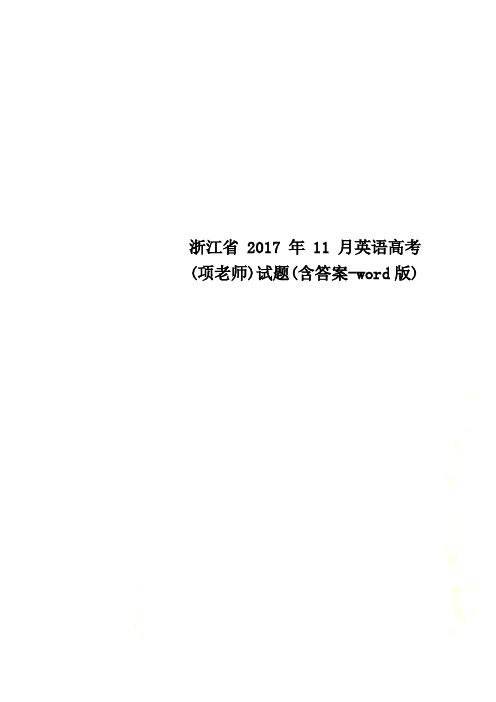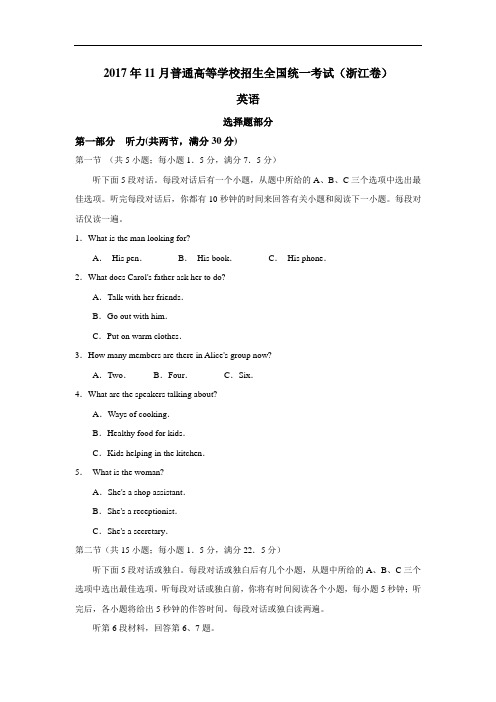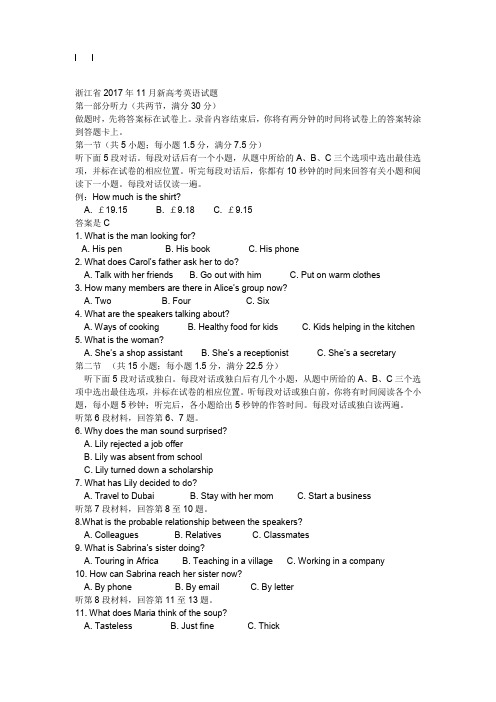浙江省2017年11英语高考试题
2017年度11月浙江高考英语试题标准答案与解析

参考答案1—5 ACBCB 6—10 CBABC 11—15 ACBAB 16—20 AABCA音频与考点分布信息音频信息考点分布信息原文与单题解析Text 1 找钢笔;29词1. What is the man looking for?A. His pen.B. His book.C. His phone.【解析】事实细节题。
根据材料中男士的话“I can’t find my pen anywhere.”可知男士正在到处找他的钢笔,故选A。
Text 2 外出需加衣服;29词2. What does Carol’s father ask her to do?A. Talk with her friends.B. Go out with him.C. Put on warm clothes.【解析】推理判断题。
根据材料中男士的话“but you can’t go out in those clothes. It’s freezing today.”和女儿回答“I’ll wear something warmer.”可推知男士让女儿穿上暖和点的衣服,故选C。
Text 3 研究小组的人数;22词3. How many members are there in Alice’s group now?A. Two.B. Four.C. Six.【解析】事实细节题。
根据材料中女士的话“there were six of us to begin with. Then two people left.”可以简单地计算出女士的小组现在有4名成员,故选B。
Text 4 让孩子在厨房帮忙;40词4. What are the speakers talking about?A. Ways of cooking.B. Healthy food for kids.C. Kids helping in the kitchen.【解析】主旨大意题。
浙江省2017年11月英语高考(项老师)试题(含答案-word版)

浙江省2017年11月英语高考(项老师)试题(含答案-word版)绝密★考试结束前(2017.11.4)2017年11月浙江省普通高校招生选考科目考试英语试题参考答案第一部分听力(共20小题;每小题1.5分,满分30分)1.A2.C3.B4.C5.B6. C7.B8. A9. B10. C11. A 12. C 13. B 14. A 15. B 16. A 17.A 18.B 19.C 20. A第二部分阅读理解第一节(共10小题;每小题2.5分,满分25分)21.B 22. B 23. A 24. D 25. C 26. C 27.B 28. D 29.C 30. A第二节(共5小题;每小题2分,满分10分)31.D 32. A 33. F 34. G 35. B第三部分语言运用第一节(共20小题;每小题1.5分,满分30分)36. A 37. B 38. D 39. C 40. D 41. C 42.A 43.B 44.C 45. D46. D 47. C 48. B 49. B 50. C 51. A 52.A 53.B 54. A 55. D第二节(共10小题;每小题1.5分,满分15分)56. an 57. which 58. months 59. for 60. effective61. really 62. sounds 63. reading 64. their 65. learned/learnt第四部分写作第一节(满分15分)One Possible VersionDear Mr. Hall,I’m writing to invite you to come to my home to celebrate the Spring Festival on January 19. It’s traditionally a time for family reunion, so my parents and my brother will all be there. We’ll make dumplings together and have a big dinner.B. Healthy food for kids.C. Kids helping in the kitchen.5. What is the woman?A. She’s a shop assistant.B. She’s a receptionist.C. She’s a secretary.第二节(共15小题;每小题1.5分,满分22.5分)听下面5段对话或独白。
2017年11月份高考英语试题(浙江卷含答案)

2017年11月普通高等学校招生全国统一考试(浙江卷)英语选择题部分第一部分听力(共两节,满分30分)第一节(共5小题;每小题1.5分,满分7.5分)听下面5段对话。
每段对话后有一个小题,从题中所给的A、B、C三个选项中选出最佳选项。
听完每段对话后,你都有10秒钟的时间来回答有关小题和阅读下一小题。
每段对话仅读一遍。
1.What is the man looking for?A.His pen.B.His book.C.His phone.2.What does Carol's father ask her to do?A.Talk with her friends.B.Go out with him.C.Put on warm clothes.3.How many members are there in Alice's group now?A.Two.B.Four.C.Six.4.What are the speakers talking about?A.Ways of cooking.B.Healthy food for kids.C.Kids helping in the kitchen.5.What is the woman?A.She's a shop assistant.B.She's a receptionist.C.She's a secretary.第二节(共15小题;每小题1.5分,满分22.5分)听下面5段对话或独白。
每段对话或独白后有几个小题,从题中所给的A、B、C三个选项中选出最佳选项。
听每段对话或独白前,你将有时间阅读各个小题,每小题5秒钟;听完后,各小题将给出5秒钟的作答时间。
每段对话或独白读两遍。
听第6段材料,回答第6、7题。
6.Why does the man sound surprised?A.Lily rejected a job offer.B.Lily was absent from school.C.Lily turned down a scholarship.7.What has Lily decided to do?A.Travel to Dubai.B.Stay with her mom.C.Start a business.听第7段材料,回答第8至10题。
2017年11月浙江英语高考试题打印

2017年11月浙江英语高考试题第一部分听力(共两节,满分30分)做题时,先将答案标在试卷上。
录音内容结束后,你将有两分钟的时间将试卷上的答案转涂到答题卡上。
第一节(共5小题;每小题1.5分,满分7.5分)听下面5段对话。
每段对话后有一个小题,从题中所给的A、B、C三个选项中选出最佳选项,并标在试卷的相应位置。
听完每段对话后,你都有10秒钟的时间来回答有关小题和阅读下一小题。
每段对话仅读一遍。
例:How much is the shirt?A. £19.15B. £9.18C. £9.15答案是C1. What is the man looking for?A. His penB. His bookC. His phone2. What does Carol’s father ask her to do?A. Talk with her friendsB. Go out with himC. Put on warm clothes3. How many members are there in Alice’s group now?A. TwoB. FourC. Six4. What are the speakers talking about?A. Ways of cookingB. Healthy food for kidsC. Kids helping in the kitchen5. What is the woman?A. She’s a shop assistantB. She’s a receptionistC. She’s a secretary第二节(共15小题;每小题1.5分,满分22.5分)听下面5段对话或独白。
每段对话或独白后有几个小题,从题中所给的A、B、C三个选项中选出最佳选项,并标在试卷的相应位置。
听每段对话或独白前,你将有时间阅读各个小题,每小题5秒钟;听完后,各小题给出5秒钟的作答时间。
2017年11月普通高等学校招生全国统一考试(浙江卷)英语试题附详解

2017年11月普通高等学校招生全国统一考试英语选择题部分第一部分听力(共两节,满分30分)第一节(共5小题;每小题1.5分,满分7.5分)听下面5段对话。
每段对话后有一个小题,从题中所给的A、B、C三个选项中选出最佳选项,并标在试卷的相应位置。
听完每段对话后,你都有10秒钟的时间来回答有关小题和阅读下一小题。
每段对话仅读一遍。
例:How much is the shirt?A. £19.15B. £9.18C. £9.15答案是C.1. What is the man looking for?A. His pen.B. His book.C. His phone.2. What does Carol’s father ask her to do?A. Talk with her friends.B. Go out with him.C. Put on warm clothes.3. How many members are there in Alice’s group now?A. Two.B. Four.C. Six.4. What are the speakers talking about?A. Ways of cooking.B. Healthy food for kids.C. Kids helping in the kitchen.5. What is the woman?A. She’s a shop assistant.B. She’s a receptionist.C. She’s a secretary.第二节(共15小题;每小题1.5分,满分22.5分)听下面5段对话或独白。
每段对话或独白后有几个小题,从题中所给的A、B、C 三个选项中选出最佳选项,并标在试卷的相应位罝。
听每段对话或独白前,你将有时间阅读各个小题,每小题5秒钟;听完后,各小题将给出5秒钟的作答时间。
2017年11月普通高等学校招生全国统一考试(浙江卷)英语

2017年11月普通高等学校招生全国统一考试英语选择题部分做题时,先将答案标在试卷上。
录音内容结束后,你将有两分钟的时间将试卷上的答案转涂到答题纸上。
第一节(共5小题;每小题1.5分,满分7.5分)听下面5段对话。
每段对话后有一个小题,从题中所给的A、B、C三个选项中选出最佳选项,并标在试卷的相应位置。
听完每段对话后,你都有10秒钟的时间来回答有关小题和阅读下一小题。
每段对话仅读一遍。
例:How much is the shirt?A. £19.15B. £9.18C. £9.15答案是C.1. What is the man looking for?A. His pen.B. His book.C. His phone.2. What does Carol’s father ask her to do?A. Talk with her friends.B. Go out with him.C. Put on warm clothes.3. How many members are there in Alice’s group now?A. Two.B. Four.C. Six.4. What are the speakers talking about?A. Ways of cooking.B. Healthy food for kids.C. Kids helping in the kitchen.5. What is the woman?A. She’s a shop assistant.B. She’s a receptionist.C. She’s a secretary.第二节(共15小题;每小题1.5分,满分22.5分)听下面5段对话或独白。
每段对话或独白后有几个小题,从题中所给的A、B、C 三个选项中选出最佳选项,并标在试卷的相应位罝。
听每段对话或独白前,你将有时间阅读各个小题,每小题5秒钟;听完后,各小题将给出5秒钟的作答时间。
207年11月浙江英语高考完整真题及答案

2017年11月普通高等学校招生全国统一考试英语科(浙江)选择题部分第一部分:听力(共两节,满分30分)第一节(共5小题;每小题1.5分,满分7.5分)听下面5段对话。
每段对话后有一个小题,从题中所给的A、B、C三个选项中选出最佳选项,并标在试卷的相应位置。
听完每段对话后,你都有10秒钟的时间来回答有关小题和阅读下一小题。
每段对话仅读一遍。
1. What is the man looking for?A. His pen.B. His book.C. His phone.2. What does Carol’s father ask her to do?A. Talk with her friends.B. Go out with him.C. Put on warm clothes.3. How many members are there in Alice’s group now?A. Two.B. Four.C. Six.4. What are the speakers talking about?A. Ways of cooking.B. Healthy food for kids.C. Kids helping in the kitchen.5. What is the woman?A. She’s a shop assistant.B. She’s a receptionist.C. She’s a secretary.第二节(共15小题;每小题1.5分,满分22.5分)听下面5段对话或独白。
每段对话或独白后有几个小题,从题中所给的A、B、C 三个选项中选出最佳选项,并标在试卷的相应位罝。
听每段对话或独白前,你将有时间阅读各个小题,每小题5秒钟;听完后,各小题将给出5秒钟的作答时间。
每段对话或独白读两遍。
听第6段材料,回答第6、7题。
6. Why does the man sound surprised?A. Lily rejected a job offer.B. Lily was absent from school.C. Lily turned down a scholarship.7. What has Lily decided to do?A. Travel to Dubai.B. Stay with her mom.C. Start a business.听第7段材料,回答第8至10题。
2017年英语真题及解析_浙江省2017年11月新高考英语试题

浙江省2017年11月新高考英语试题第一部分听力(共两节,满分30分)做题时,先将答案标在试卷上。
录音内容结束后,你将有两分钟的时间将试卷上的答案转涂到答题卡上。
第一节(共5小题;每小题1.5分,满分7.5分)听下面5段对话。
每段对话后有一个小题,从题中所给的A、B、C三个选项中选出最佳选项,并标在试卷的相应位置。
听完每段对话后,你都有10秒钟的时间来回答有关小题和阅读下一小题。
每段对话仅读一遍。
例:How much is the shirt?A. £19.15B. £9.18C. £9.15答案是C1. What is the man looking for?A. His penB. His bookC. His phone2. What does Carol’s father ask her to do?A. Talk with her friendsB. Go out with himC. Put on warm clothes3. How many members are there in Alice’s group now?A. TwoB. FourC. Six4. What are the speakers talking about?A. Ways of cookingB. Healthy food for kidsC. Kids helping in the kitchen5. What is the woman?A. She’s a shop assistantB. She’s a receptionistC. She’s a secretary第二节(共15小题;每小题1.5分,满分22.5分)听下面5段对话或独白。
每段对话或独白后有几个小题,从题中所给的A、B、C三个选项中选出最佳选项,并标在试卷的相应位置。
听每段对话或独白前,你将有时间阅读各个小题,每小题5秒钟;听完后,各小题给出5秒钟的作答时间。
- 1、下载文档前请自行甄别文档内容的完整性,平台不提供额外的编辑、内容补充、找答案等附加服务。
- 2、"仅部分预览"的文档,不可在线预览部分如存在完整性等问题,可反馈申请退款(可完整预览的文档不适用该条件!)。
- 3、如文档侵犯您的权益,请联系客服反馈,我们会尽快为您处理(人工客服工作时间:9:00-18:30)。
绝密★考试结束前()2017年11月浙江省普通高校招生选考科目考试英语试题参考答案第一部分听力(共20小题;每小题分,满分30分)6. C 8. A 9. B 10. C11. A 12. C 13. B 14. A 15. B 16. A 17. A 18. B 19. C 20. A第二部分阅读理解第一节(共10小题;每小题分,满分25分)22. B 23. A 24. D 25. C 26. C 27. B 28. D 29. C 30. A第二节(共5小题;每小题2分,满分10分)32. A 33. F 34. G 35. B第三部分语言运用第一节(共20小题;每小题分,满分30分)36. A 37. B 38. D 39. C 40. D 41. C 42. A 43. B 44. C 45. D46. D 47. C 48. B 49. B 50. C 51. A 52. A 53. B 54. A 55. D第二节(共10小题;每小题分,满分15分)56. an 57. which 58. months 59. for 60. effective61. really 62. sounds 63. reading 64. their 65. learned/learnt第四部分写作第一节(满分15分)One Possible VersionDear Mr. Hall,I’m writing to invite you to come to my home to celebrate the Spring Festival on January19. It’s traditionally a time for family reunion, so my parents and my brother will all be there. We’ll make dumplings together and have a big dinner. We’ll also play card games and watch the Spring Festival Gala on TV. You may even get a gift from my parents. If you’re able to come, I’ll go and pick you up at your place.Best,Li Hua绝密★考试结束前()2017年11月浙江省普通高校招生选考科目考试英语试题第一部分听力(共两节,满分30分)第一节(共5小题;每小题分,满分分)听下面5段对话。
每段对话后有一个小题,从题中所给的A、B、C三个选项中选出最佳选项,并标在试卷的相应位置。
听完每段对话后,你都有10秒钟的时间来回答有关小题和阅读下一小题。
每段对话仅读一遍。
1. What is the man looking for?A. His pen.B. His book.C. His phone.2. What does Carol’s father ask her to do?A. Talk with her friends.B. Go out with him.C. Put on warm clothes.3. How many members are there in Alice’s group now?A. Two.B. Four.C. Six.4. What are the speakers talking about?A. Ways of cooking.B. Healthy food for kids.C. Kids helping in the kitchen.5. What is the woman?A. She’s a shop assistant.B. She’s a receptionist.C. She’s a secretary.第二节(共15小题;每小题分,满分分)听下面5段对话或独白。
每段对话或独白后有几个小题,从题中所给的A、B、C 三个选项中选出最佳选项,并标在试卷的相应位罝。
听每段对话或独白前,你将有时间阅读各个小题,每小题5秒钟;听完后,各小题给出5秒钟的作答时间。
每段对话或独白读两遍。
听第6段材料,回答第6、7题。
6. Why does the man sound surprised?A. lily rejected a job offer.B. Lily was absent from school.C. Lily turned down a scholarship.7. What has Lily decided to do?A. Travel to Dubai.B. Stay with her mom.C. Start a business.听第7段材料,回答第8至10题。
8. What is the probable relationship between the speakers?A. Colleagues.B. Relatives.C. Classmates.9. What is Sabrina’s sister doing?A. Touring in Africa.B. Teaching in a village.C. Working in a company.10. How can Sabrina reach her sister now?A. By phone.B. By email.C. By letter.听第8段材料,回答11至13题11. What does Maria think of the soup?A. Tasteless.B. Just fine.C. Thick.12. What does Karl say can be added to the soup?A. Salt.B. Onions.C. Pepper.13. Where are the speakers?A. At home.B. At a restaurant.C. At a frien d’s house.听第9段材料,回答14至16题14. When will someone come to check the hot water?A. This afternoon.B. Tomorrow.C. At the weekend.15. How did the students know about the flat?A. From a friend.B. From a newspaper.C. From a house agency.16. What will the woman do to settle the problem about the fridge?A. Pay the students for the new one.B. Get someone to fix the old oneC. Order one on the Internet.听第10段材料,回答17至20题17. Who is the speaker?A. An invited guest.B. A news reporter.C. A radio host.18. In what way has the speaker changed?A. He speaks faster.B. He becomes heavier.C. He cooks more often.19. What is difficult for the speaker to get used to?A. The food.B. The weather.C. The language.20. What does the speaker think of the French people?A. A bit cold.B. Generous.C. Easy-going.第二部分阅读理解(共两节,满分35分)第一节(共10小题;每小题分,满分25分)阅读下列短文,从每题所给的A、B、C和D四个选项中,选出最佳选项。
AWhen I was in fourth grade, I worked part-time as a paperboy. was one of my customers. She’d watch me coming down her street, and by the time I'd biked up to her doorstep, there’d be a cold drink waiting. I’d sit and drink whil e she talked.talked mostly about her dead husband, “Mr. Stanley and I went shopping this morning,”she’d say. The first time she said that, soda(汽水) went up my nose.I told my father how Mrs. Stanley talked as if Mr. Stanley were still alive. Dad said she was probably lonely, and that I ought to sit and listen and nod my head and smile, and maybe she’d work it out of her system. So that’s what I did, and it turned out Dad was right. After a while she seemed content to leave her husband over at the cemetery(墓地).I finally quit delivering newspapers and didn’t see Mrs. Stanley for several years. Then we crossed paths at a church fund-raiser(募捐活动). She was spooning mashed potatoes and looking happy. Four years before, she’d had to offer her paperboy a drink to have someone to talk with. Now she had friends. Her husband was gone, but life went on.I live in the city now, and my paperboy is a lady named Edna with three kids. She asks me how I’m doing. When I don’t say “fine,” she sticks around to hea r my problems. She’s lived in the city most of her life, but she knows about community. Community isn’t so much a place as it is a state of mind. You find it whenever people ask how you’re doing because they care, and not because they’re getting paid to do so. Sometimes it’s good to just smile, nod your head and listen.21. Why did soda go up the author’s nose one time?A. He was talking fast.B. He was shocked.C. He was in a hurry.D. He was absent-minded.22. Why did the author sit and listen to Mrs. Stanley according to Paragraph 3?A. He enjoyed the drink.B. He wanted to be helpful.C. He took the chance to rest.D. He tried to please his dad.23. Which of the following can replace the underlined phrase “work it out of her system”?A. recover from her sadnessB. move out of the neighborhoodC. turn to her old friendsD. speak out about her past24. What does the author think people in a community should do?A. Open up to others.B. Depend on each other.C. Pay for others’ help.D. Care about one another.BIt’s surprising how much simple movement s of the body can affect the way we think. Using expansive gestures with open arms makes us feel more powerful, crossing your arms makes you more determined and lying down can bring more insights (领悟).So if moving the body can have these effects, what about the clothes we wear? We’re all well aware of how dressing up in different ways can make us feel more attractive, sporty or professional, depending on the clothes we wear, but can the clothes actually change cognitive(认知) performance or is it just a feeling?Adam and Galinsky tested the effect of simply wearing a white lab coat on people’s powers of attention. The idea is that white coats are associated with scientists, who are in turn thought to have close attention to detail.What they found was that people wearing white coats performed better than those who weren’t. Indeed, they made only half as many errors as those wearing their own clothes on the Stroop Test (one way of measur ing attention). The researchers call the effect “enclothed cognition,” suggesting that all manner of different clothes probably affect our cognition in many different ways.This opens the way for all sorts of clothes-based experiments. Is the writer who wears a fedora more creative? Is the psychologist wearing little round glasses and smoking a cigar more insightful? Does a chef’s hat make the resultant food taste better?From now on I will only be editing articles for PsyBlog while wearing a white coat to help keep the typing error count low. Hopefully you will be doing your part by reading PsyBlog ina cap and gown(学位服).25. What is the main idea of the text?A. Body movements change the way people think.B. How people dress has an influence on their feelings.C. What people wear can affect their cognitive performance.D. People doing different jobs should wear different clothes.26. Adam and Galinsky’s ex periment tested the effect of clothes on their wearers’___________.A. insightsB. movementsC. attentionD. appearance27. How does the author sound in the last paragraph?A. Academic.B. Humorous.C. Formal.D. Hopeful.CThere are energy savings to be made from all recyclable materials, sometimes huge savings. Recycling plastics and aluminum, for instance, uses only 5% to 10% as much energy as producing new plastic or smelting(提炼) aluminum.Long before most o f us even noticed what we now call “ environment,” Buckminster Fuller said, “Pollution is nothing but the resources(资源) we are not harvesting. We allow them to be left around because we’ve been ignorant of their value.”To take one example, let’s compare the throwaway economy(经济) with a recycling economy as we feed a cat for life.Say your cat weigh 5kg and eats one can of food each day. Each empty can of its food weights 40g. In a throwaway economy, you would throw away 5,475 cans over the cat’s 15-year lifetime. That’s 219kg of steel-more than a fifth of a ton and more than 40 times the cat’s weight.In a recycling economy, we would make one set of 100 cans to start with, then replace them over and over again with recycled cans. Since almost 3% of the metal is lost during reprocessing, we’d have to make an extra 10 cans each year. But in all, only 150 cans will be used up over the cat’s lifetime—and we’ll still have 100 left over for the next cat.Instead of using up 219kg of steel, we’ve used onl y 6kg. And because the process of recycling steel is less polluting than making new steel, we’ve also achieved the following significant savings: in energy use—47% to 74%; in air pollution—85%; in water pollution—35%; in water use—40%.28. What does Buckminster Fuller say about pollution?A. It is becoming more serious.B. It destroys the environment.C. It benefits the economy.D. It is the resources yet to be used.29. How many cans will be used up in a cat’s 15-year lifetime in a recycling economy?A. 50B. 100C. 150D. 25030. What is the author’s purpose in writing the text?A. To promote the idea of recycling.B. To introduce an environmentalist.C. To discuss the causes of pollution.D. To defend the throwaway economy.第二节(共5小题;每小题2分,满分10分)根据短文内容,从短文后的选项中选出能填入空白处的最佳选项。
